#a.d. 1200
Explore tagged Tumblr posts
Text

~ Skull Necklace.
Culture: Aztec
Period: Late Postclassic
Date: A.D. 1200-1520
Medium: Shell
#13th century#16th century#aztec#history#museum#archeology#archaeology#jewelry#Mesoamerica#mexico#mexican#pre columbian#late Postclassic#shell#necklace#skull#skull necklace#a.d. 1200#a.d. 1520
3K notes
·
View notes
Text
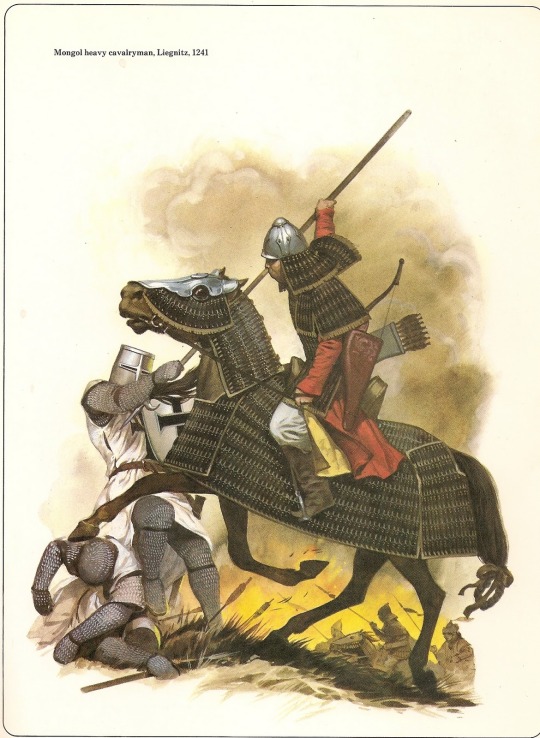
SPOTLIGHT ON THE SIGNIFICANCE OF HEAVY MONGOL CAVALRY IN BATTLEFIELD STRATEGY.
PIC INFO: Spotlight on a Mongol heavy cavalryman, Liegnitz (present day Legnica, Poland), c. 1241, the Mongol Empire. Artwork by the late, great Angus McBride.
OVERVIEW: "While a standard Mongol army did field a large number of horse archers, entire battles couldn’t be won by just one tactical arm of the force. In fact, almost equally (if not more) crucial was the Heavy Cavalry that was tailored to counter-attacking maneuvers. These heavy horsemen were mostly armored in Asiatic lamellar style where scales of metal (or hardened leather) were sewn together through tiny holes.
PART II: Sometimes entire coats were reinforced with metallic pieces – and they were possibly worn beneath dedicated armor systems for added protection, thus alluding to super-heavy cavalry units. Similarly, helmets were crafted from larger iron pieces, but they characteristically featured extended neck guards made of metallic bits. And as for arms, most of these heavy horsemen used lances, possibly both in couched and overhead positions."
-- REALM OF HISTORY (Dattatreya Mandal, February, 10, 2016)
Source: http://miniaturasmilitaresalfonscanovas.blogspot.com/2012/02/angus-mcbride-los-mongoles.html.
#Mongol Cavalry#The Mongols#Mongols#Mongol Warfare#Heavy Cavalryman#Osprey Publishing#Angus McBride Art#Mongol Empire#Mongol Heavy Cavalry#Mongol Heavy Cavalryman#Leignitz#Heavy Cavalry#Mongol Army#Legnica#Legnica Poland#Mongol Warfare History#Military History#Mongol Empire 1241#Angus McBride#The Mongol Empire#Cavalryman#Illustration#World History#The Mongols Osprey Publishing#1200s#Mongol Invasion of Europe#1241 A.D.#1241#Central Asia#Mongol Cavalryman
7 notes
·
View notes
Video
youtube
Garbage - Only Happy When It Rains
#youtube#garbage#In The World How Am I Doing As A Fan-52 And Still looking For My First Any-Thing Mam And Men....Hosanna In His Highest Regard aka King Ralf#The 1st. James Tiberius Hook After-(in)-Scotland I Was And Am Your Former King-Also A Good Bruce To Russia Or Prussia Then-I Was Uther Va#n-PenDragon's Father And Best Friend As Well...When Arthur Was But A Little One I Became The Hook-(Born Next As James Tiberius Hook On Oct 2#nd.1200 a.d.-#Too 1383 a.d.....Many Scallop's And Vessel's (Admiral Hook I Was Layed To)'-Rest#And Then As HOOK#..Like Now-"I Found I Was hosanna And Joshua From The Holy Bible.'#Hook Out.#HOSANNA Sorry Mrs.Garbage. And Men
1 note
·
View note
Text
Vrrrroooom, vrroom
Worn but serviceable. Boy, don’t I know the meaning of those words! It seems lately that “worn but serviceable” is the story of the hour/day/week/month/year. There’s nothing shiny left here, but I — we — can still get on down the road. The motorbike was parked in the ancient town of Perouges. According to the archaeological findings, humans have been present at Pérouges since the Chalcolithic…
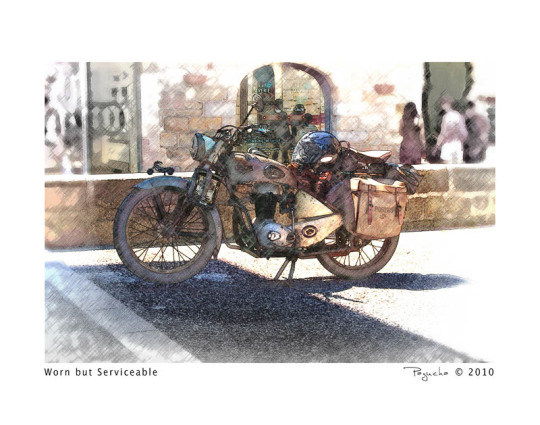
View On WordPress
0 notes
Text
Zuni farmers in the southwestern United States made it through long stretches of extremely low rainfall between A.D. 1200 and 1400 by embracing small-scale, decentralized irrigation systems. Farmers in Ghana coped with severe droughts from 1450 to 1650 by planting indigenous African grains, like drought-tolerant pearl millet. Ancient practices like these are gaining new interest today. As countries face unprecedented heat waves, storms and melting glaciers, some farmers and international development organizations are reaching deep into the agricultural archives to revive these ancient solutions. Drought-stricken farmers in Spain have reclaimed medieval Moorish irrigation technology. International companies hungry for carbon offsets have paid big money for biochar made using pre-Columbian Amazonian production techniques. Texas ranchers have turned to ancient cover cropping methods to buffer against unpredictable weather patterns. But grasping for ancient technologies and techniques without paying attention to historical context misses one of the most important lessons ancient farmers can reveal: Agricultural sustainability is as much about power and sovereignty as it is about soil, water and crops.
381 notes
·
View notes
Text



I've been looking through old Ral Partha catalogs because I've been reorganizing some of the first historical miniatures I ever painted, from their 1200 A.D. line from the late 1970s-early 80s. Conveniently, Ral Partha's own Chaos Wars rules work with units of 12 foot and 6 mounted as do many modern rules including Midgard, Impetus, and Lion Rampant. I've been painting more to fill out units, some collected years ago, some recently picked up to fill gaps, with a handful of "Ral Partha Imports" (licensed from the Citadel DA Dark Ages line), Essex, and Fantascenes "revolting peasants" in the mix, all in true 25mm scale or close enough to it.
#Ral Partha#Chaos Wars#wargaming#historical miniatures#miniature wargaming#miniatures#medieval#Norman Conquest#Citadel Miniatures#Essex#Fantascenes#historical wargaming#Ral Partha 1066 project
73 notes
·
View notes
Text
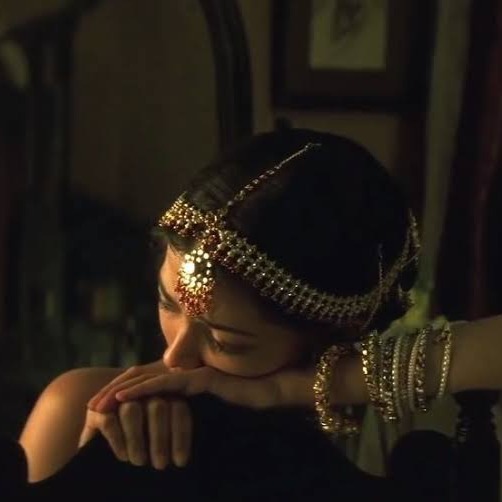
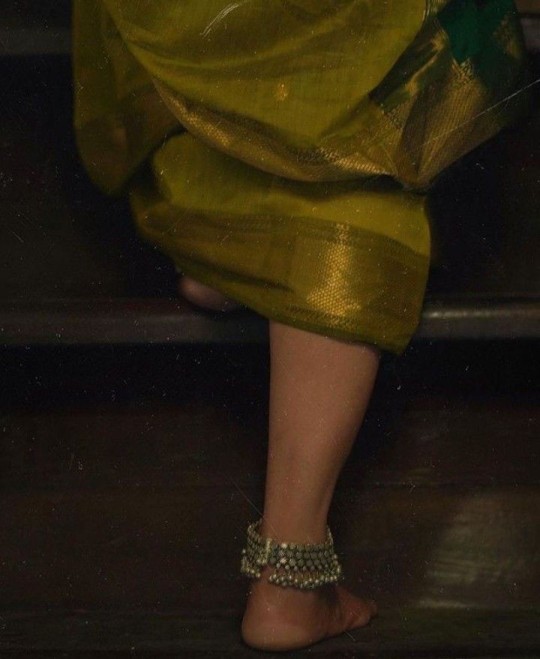

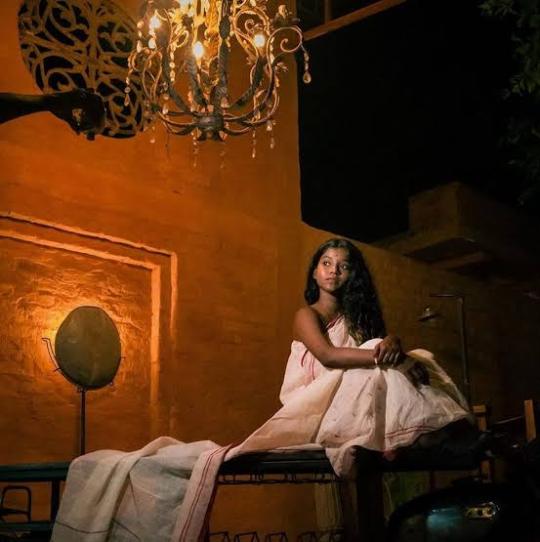
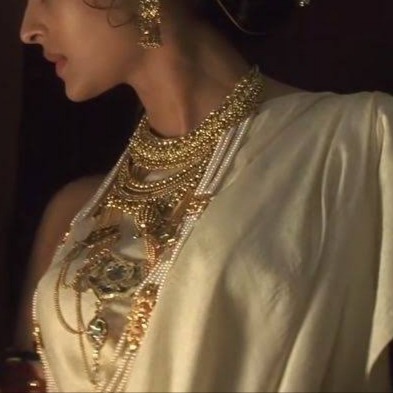
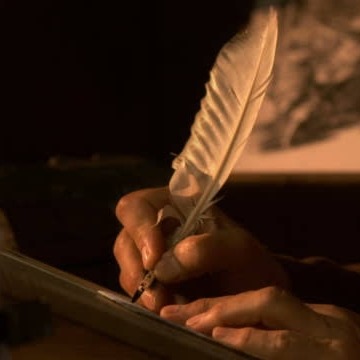
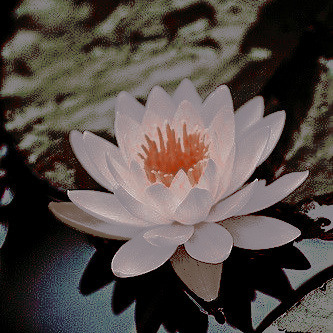
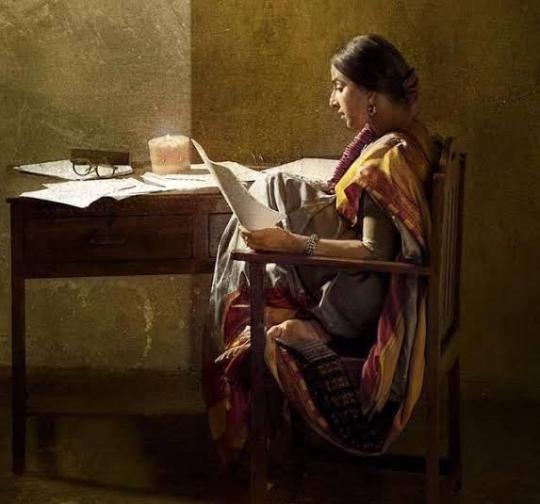
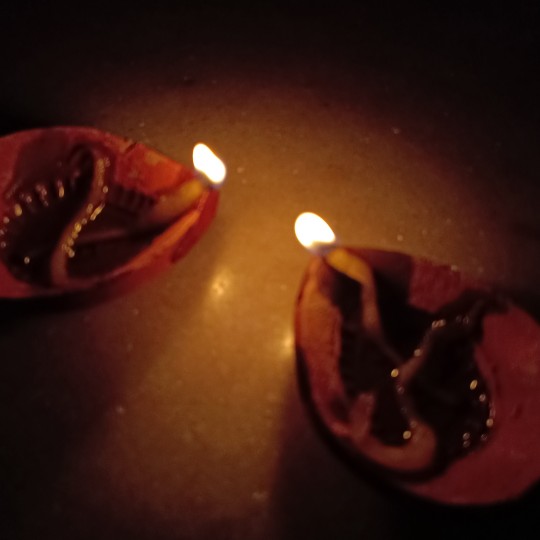
Khona was a poet and astronomer from Deulia village in Bengal, best known for Khonar Bochon, a series of couplets and short rhymes which imparts advice regarding agricultural and rural life. Born somewhere between 800-1200 A.D., Khona defied social and cultural norms of her time when women were rarely taught to read. Her husband Mihir was the son of the philosopher and astronomer Barahmihir, who was one of the navaratnas (nine gems) at the court of Chandragupta II. Khona lived in Chandragupta's court in Pataliputra for a time with her husband and father-in-law. According to legend, Chandragupta was so impressed with Khonar Bochon which benefited the farmers of his state that he named Khona the tenth gem of his court. Khonar Bochon remains relevant to the agricultural life of rural Bengal to the present day.
ষোল চাষে মূলা / তার অর্ধেক তুলা / তার অর্ধেক ধান / বিনা চাষে পান।
Translation: After 16 days of cultivation, radish cultivation in that land gives good yield. Cotton land requires 8 days of cultivation, paddy land after 4 days of cultivation gives good yield. Betel does not require cultivation.
1 / 2 / 3 / 4 / 5 / 6 / 7 / 8 / 9
#mb#khona#khonar bochon#khana#bengali academia#bangla tag#bangladesh#india#desi academia#dark academia#desi aesthetic#desi tag#desi tumblr#desiblr#bengali#indian history#ancient india#khonar bochor for anon#bengali literature
432 notes
·
View notes
Text

From: Publius Ovidius Naso, (43 B.C.-17 or 18 A.D.), Metamorphosĕon libri XV, [manuscript written in a Bari variant of the Beneventan script], 1000-1200 [Biblioteca Nazionale di Napoli, Napoli. Library of Congress, Washington, D.C.]
#manuscript#poetry#script#visual writing#book#publius ovidius naso#publio ovidio nasone#ovidio#biblioteca nazionale di napoli#library of congress#1200s
74 notes
·
View notes
Text
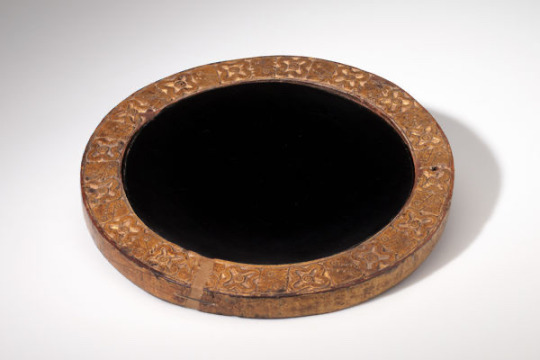
Obsidian Mirror
A.D. 1200–1521 (Mirror); 16th century (Frame)
Mexico
Aztec
Obsidian, wood, gold leaf
35 cm
30 notes
·
View notes
Text

House On Fire Ruins. (1200 A.D.) - Mule Canyon, Utah
9 notes
·
View notes
Text

ARIZONA INTERESTING FACTS:
1. Arizona has 3,928 mountain peaks and summits, more mountains than any one of the other Mountain States (Colorado, Idaho, Montana, Nevada, New Mexico, Utah, and Wyoming).
2. All New England, plus the state of Pennsylvania would fit inside Arizona.
3. Arizona became the 48th state and last of the contiguous states on February 14, 1912, Valentine’s Day.
4. Arizona's disparate climate can yield both the highest temperature across the nation and the lowest temperature across the nation in the same day.
5. There are more wilderness areas in Arizona than in the entire Midwest. Arizona alone has 90 wilderness areas, while the Midwest has 50.
6. Arizona has 26 peaks that are more than 10,000 feet in elevation.
7. Arizona has the largest contiguous stand of Ponderosa pines in the world stretching from near Flagstaff along the Mogollon Rim to the White Mountains region.
8. Yuma, Arizona is the country's highest producer of winter vegetables, especially lettuce.
9. Arizona is the 6th largest state in the nation, covering 113,909 square miles.
10. Out of all the states in the U.S., Arizona has the largest percentage of its land designated as Indian lands.
11. The Five C's of Arizona's economy are: Cattle, Copper, Citrus, Cotton, and Climate.
12. More copper is mined in Arizona than all the other states combined The Morenci Mine is the largest copper producer in all of North America.
13. Clark Gable and Carole Lombard, two of the most prominent movie stars of Hollywood's Golden Age, were married on March 18, 1939, in Kingman, Arizona.
14. Covering 18,608 sq. miles, Coconino County is the second largest county by land area in the 48 contiguous United States.(San Bernardino County in California is the largest).
15. The world's largest solar telescope is located at Kitt Peak National Observatory in Sells, Arizona.
16. Bisbee, Arizona is known as the Queen of the Copper Mines because during its mining heyday it produced nearly 25 percent of the world's copper. It was the largest city in the Southwest between Saint Louis and San Francisco.
17. Billy the Kid killed his first man, Windy Cahill, in Bonita, Arizona.
18. Arizona grows enough cotton each year to make more than one pair of jeans for every person in the United States.
19. Famous labor leader and activist Cesar Chavez was born in Yuma.
20. In 1912, President William Howard Taft was ready to make Arizona a state on February 12, but it was Lincoln's birthday.
The next day, the 13th, was considered bad luck so they waited until the following day. That's how Arizona became known as the Valentine State.
21. When England's famous London Bridge was replaced in the 1960s, the original was purchased, dismantled, shipped stone by stone and reconstructed in Lake Havasu City, Arizona, where it still stands today.
22. Mount Lemmon, Tucson, in the Santa Catalina Mountains, is the southernmost ski resort in the United States.
23. Rooster Cogburn Ostrich Ranch in Picacho, Arizona is the largest privately-owned ostrich ranch in the world outside South Africa.
24. If you cut down a protected species of cactus in Arizona, you could spend more than a year in prison.
25. The world's largest to-scale collection of miniature airplane models is housed at the library at Embry-Riddle Aeronautical University in Prescott, Arizona.
26. The only place in the country where mail is delivered by mule is the village of Supai, located at the bottom of the Grand Canyon.
27. Located on Arizona's western border, Parker Dam is the deepest dam in the world at 320 feet.
28. South Mountain Park/Preserve in Phoenix is the largest municipal park in the country.
29. Palo Verde Nuclear Generating Station, located about 55 miles west of Phoenix, generates more electricity than any other U.S. power plant.
30. Oraibi, a Hopi village located in Navajo County, Arizona, dates back to before A.D. 1200 and is reputed to be the oldest continuously inhabited community in America.
31. Built by Del Webb in 1960, Sun City, Arizona was the first 55-plus active adult retirement community in the country.
32. Petrified wood is the official state fossil. The Petrified Forest in northeastern Arizona contains America's largest deposits of petrified wood.
33. Many of the founders of San Francisco in 1776 were Spanish colonists from Tubac, Arizona.
34. Phoenix originated in 1866 as a hay camp to supply military post Camp McDowell.
35. Rainfall averages for Arizona range from less than three inches in the deserts to more than 30 inches per year in the mountains.
36. Rising to a height of 12,643 feet, Humphreys Peak north of Flagstaff is the state's highest mountain.
37. Roadrunners are not just in cartoons! In Arizona, you'll see them running up to 17-mph away from their enemies.
38. The Saguaro cactus is the largest cactus found in the U.S. It can grow as high as a five-story building and is native to the Sonoran Desert, which stretches across southern Arizona.
39. Sandra Day O'Connor, the first woman appointed to the U.S. Supreme Court, grew up on a large family ranch near Duncan, Arizona.
40. The best-preserved meteor crater in the world is located near Winslow, Arizona.
41. The average state elevation is 4,000 feet.
42. The Navajo Nation spans 27,000 square miles across the states of Utah, Arizona and New Mexico, but its capital is seated in Window Rock, Arizona.
43. The amount of copper utilized to make the copper dome atop Arizona's Capitol building is equivalent to the amount used in 4.8 million pennies.
44. Near Yuma, the Colorado River's elevation dips to 70 feet above sea level, making it the lowest point in the state.
45. The geographic center of Arizona is 55 miles southeast of Prescott near the community of Mayer.
46. You could pile four 1,300-foot skyscrapers on top of each other and they still would not reach the rim of the Grand Canyon.
47. The hottest temperature recorded in Arizona was 128 degrees at Lake Havasu City on June 29, 1994.
48. The coldest temperature recorded in Arizona was 40 degrees below zero at Hawley Lake on January 7, 1971.
49. A saguaro cactus can store up to nine tons of water.
50. The state of Massachusetts could fit inside Maricopa County (9,922 sq. miles).
51. The westernmost battle of the Civil War was fought at Picacho Pass on April 15, 1862 near Picacho Peak in Pinal County.
52. There are 11.2 million acres of National Forest in Arizona, and one-fourth of the state forested.
53. Wyatt Earp was neither the town marshal nor the sheriff in Tombstone at the time of the shoot-out at the O..K. Corral. His brother Virgil was the town marshal.
54. On June 6, 1936, the first barrel of tequila produced in the United States rolled off the production line in Nogales, Arizona.
55. The Sonoran Desert is the most biologically diverse desert in North America.
56. Bisbee is the Nation's Southernmost mile-high city.
57. The two largest man-made lakes in the U.S. are Lake Mead and Lake Powell, both located in Arizona.
58. The longest remaining intact section of Route 66 can be found in Arizona and runs from Seligman to Topock, a total of 157 unbroken miles.
59. The 13 stripes on the Arizona flag represent the 13 original colonies of the United States.
60. The negotiations for Geronimo's final surrender took place in Skeleton Canyon, near present day Douglas, Arizona, in 1886.
61. Prescott, Arizona is home to the world's oldest rodeo, and Payson, Arizona is home to the world's oldest continuous rodeo, both of which date back to the 1880's.
62. Kartchner Caverns, near Benson, Arizona, is a massive limestone cave with 13,000 feet of passages, two rooms as long as football fields, and one of the world's longest soda straw stalactites: measuring 21 feet 3 inches.
63. You can carry a loaded firearm on your person, no permit required.
64. Arizona has one of the lowest crime rates in the U.S.A.
36 notes
·
View notes
Text


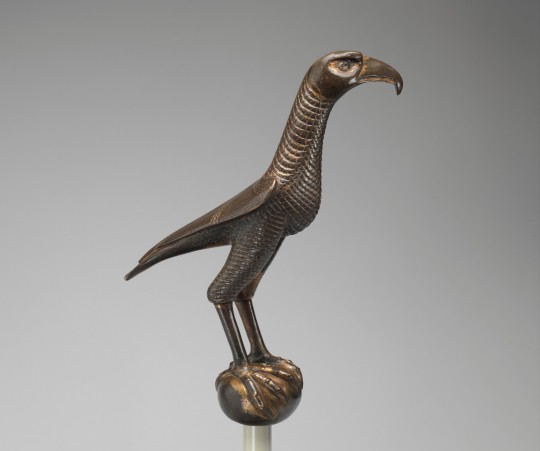
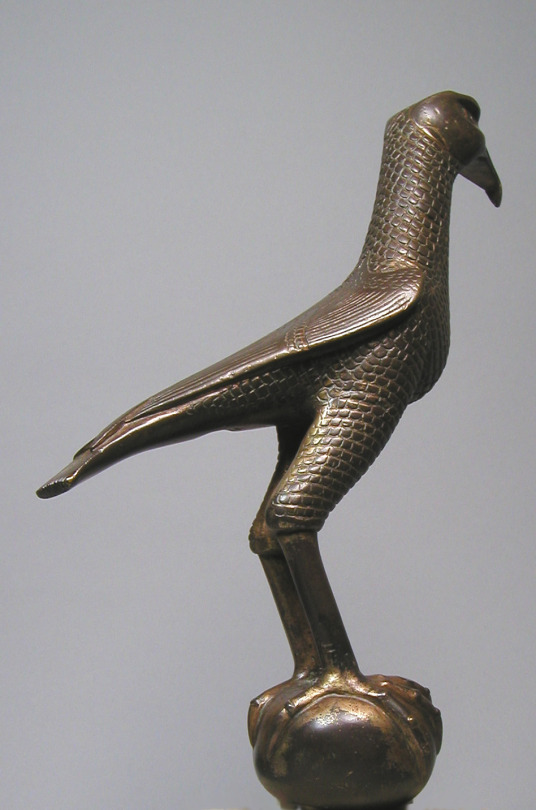
~ Falcon.
Date: ca. A.D. 1200–1220
Culture: South Italian
Medium: Bronze, traces of gilding
#history#museum#archaeology#falcon#13th century#13th century art#medieval#middle ages#a.d. 1200#a.d. 1220
782 notes
·
View notes
Text
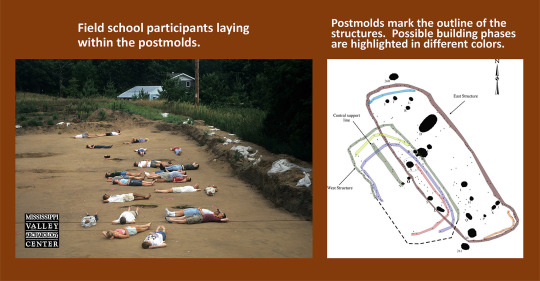
The Meier Farm Site is part of the Sand Lake Archaeological District, and represents a village associated with extensive ridged agricultural fields that have been found nearby. The house structure that was examined in 2003 was one of the very few such structures in the La Crosse area that archaeologists have ever had the opportunity to investigate. The others that we presume existed have all been destroyed by decades of cultivation. This structure was defined by over 300 post holes, small circular stains left when wooden posts decayed. The structure was probably similar to a wigwam, or a long rectangular building.
Most of the cultural remains that were found at the site are characteristic of the Oneota time period, from 1300 to 1625 A.D. In addition, several features were found that had Woodland or grit-tempered pottery probably dating to between 700 and 1200 A.D., suggesting that the location had been occupied multiple times in the past.
Link to read more about the Sand Lake Archaeological District - Meier Farm site: https://www.uwlax.edu/mvac/past-cultures/specific-sites/sand-lake-archaeological-district/
7 notes
·
View notes
Text
RUNES HISTORY AND FACTS
There are many types of rune systems, including Younger Futhark, Anglo-Frisian Futhorc, Medieval runes, and Elder Futhark, which are the ones I’ll be talking about.
The Younger Futhark (long twig) has 16 runes and is typically used in translation with Old Norse. It was used in Scandinavia during the Viking Age, from 800 A.D to 1200 A.D.
Then you have Anglo-Frisian (Frisian being Dutch), which had around 30 runes and was used in Britain. It’s also known as Anglo-Frisian Futhorc.
The latest and closest to us is the Medieval Runes, which fall back into a 24 system (like Elder Futhark) with the Roman/Latin alphabet, which is also used in translation to Old Norse.
Finally, the Rune system we’re talking about is the Elder Futhark used in a 24-rune system and is used to translate proto-European languages (proto-Germanic, high Italic, proto-English, etc, NOT Old Norse!) None of the names of the Elder Futhark have truly been written down; they have come from reconstruction and guesswork from scholars. The names have come from Old English/Gothic sources and the Rune poems that feature names and pieces associated with names.
Norse=Runa English=Rune both meaning “a secret” or “mystery”
Old Norse=Rún Old Irish=Rún Middle Welsh=Rhin “to whisper” “secret” or “mystery”
Scots=Roun “To whisper” or “speak often about one thing”. It’s also associated with the Rowan tree in Scots, which is a very well-known magical tree in many folklores (also known as the “rune tree” or “the whisper tree”).
It was believed the Elder Futhark came from the Rome/Latin alphabet and had ancient Greek relations—due to the closeness of the Germanic tribes there and the mingling of Elder Futhark and High Italic.
The runes were not traditionally used as magical symbols. they were used in divination but were not considered magical themselves until later centuries, far after the Viking Age when they became popular as magical symbols. The furthest back they were found to be used was theorized to be Germania, as typically (but not always) female diviners would “cast lots” which were believed to later influence the Norse people to cast the runes. It was widespread for Norse kings, warlords, and explorers of this time to have a rune caster or diviner with them wherever they traveled. Diviners and Rune Casters at this time were well respected and always welcomed into people's homes.
Then in the myths, we find where Odin discovers the runes and shares them with the other gods. Later the gods share them with humanity. The god Odin stabbed himself with his spear, Gungnir, and hung himself from Yggdrasil for 9 days and nights without food or water sacrificing himself for the runes till they appeared to him in the Well Of Urd. This myth differs depending on the source you found it on. Then in the Havamal 80’ page, 31 of Jackson Crawford's translation of the Poetic Edda (elder edda), it states, “What you ask the runes will prove true; they are gifts of the Aesir, made by the gods and painted by Odin. You’ll learn best with your mouth shut.”
Freyr’s Aett
Fehu Uruz Thurisaz Ansuz Raidho Kenuz Gebo Wunjo
Hagal’s Aett
Halagaz Nauthiz Isa Jera Eihwaz Perthro Algiz Sowulo
Tyr’s Aett
Tiwaz Berkana Ehwaz Mannaz Lagaz Ingwaz Dagaz Othala
24 runes in total for the Elder Futhark
Freyr’s Aett
Everything for your basic human existence, talking with the divine, human social life, and the earth and its bounty, and how to live our lives happily or at least contently.
Hagal’s Aett
shows us how to navigate the difficult parts of life when things take a rough turn and you don’t know what to do. This Aett shows us how to move forward in life and cause change and unexpected luck for ourselves.
Tyr’s Aett
This Aett shows us how to connect with life around us like. We learn to connect with and communicate with Humanity, deities, and nature around us, as well as how to connect our physical worlds to the unseen spiritual worlds we work in.
Getting into the runes themselves and the meanings and associations
Fehu
Letter-F
God/Goddess-Freyja, Freyr
Meaning-Wealth or cattle
Association-Wealth, Livestock/cattle, prosperity, abundance, fulfillment, stability, success, new beginnings, things earned and won, reward, good health, unexpected good luck
Runic poems- Old English, “Wealth provides comfort, but you must share it who hopes to cast lots for judgment before the gods.”
Norwegian, “Money causes strife among kin; the wolf grows up in the woods.” Icelandic, “Money causes strife among kin, and the fire of the flood tide and the path of the serpent.”
Uruz
Letter-U
god/goddess-Ullr, Audhumla (the creation cow), Thor
Meaning-Ox or bull sometimes bison
Association- challenges, endurance, courage, strength, untamed potential, good health, good luck, moving forward after being stuck in stagnation, sudden breakthroughs, overcoming challenges, trials, power, creative forces
Rune poems- Old Norse, “The wild ox has great high horns with which it gores; a fierce fighter who boldly stamps the moors.”
Norwegian, “Slag is cast from bad iron; reindeer cross the hard snow.”
Icelandic, “Drizzle is the weeping of clouds, and blights the harvest and is hated by the herdsmen.”
Thurisaz
Letter-Th
god/goddess-Thor
Meaning-Giant or Thorn
Association-Strength, breaking down barriers, Thor's hammer, defense, reaction, temptations, resisting temptations, disruption, passion, protection, conflict, power
Rune poems- Old Norse, “Thorn is wickedly sharp and causes pain to those who grasp it, hurt to you who rest among them.”
Norwegian, “Giant causes the sickness of women; bad luck pleases nobody.”
Icelandic, “Giant is the torment of women, and the dweller of rocky vales and husband of Varthrun the giantess.”
Ansuz
Letter-A
God/goddess-The aesir, Odin
Meaning-Aesir, the ancestor god
Association-communication with the gods, wisdom, divine power, knowledge, creativity, understanding, passing tests, understanding, communication
Rune Poems- Old Norse, “Mouth is the source of the word, bringing wisdom and counsel to the wise, hope, inspiration, and a blessing to all.”
Norwegian, “Rivermouth opens most journeys; but the sword belongs in it’s sheath.” Icelandic, “Odin is the ancient creator, and Asgards king and lord of Valhalla.”
Raidho
Letter-R
God/goddess-Sol
Meaning-Wagon or chariot
Association-Rythme, journey, travel, personal development, change, evolution, decisions, taking the opportunity, movement
Rune poems- Old Norse, “Riding is easy for heroes inside a hall; it’s much harder astride a strong horse pounding against the great mile.”
Norwegian, “Riding is said to be the worst for horses; reginn forged the best sword.”
Icelandic, “Riding is a sweet sitting and a swift journey and the toil of the horse.”
Kenaz
Letter-K and C
God/goddess-Loki
Meaning- the torch
Association-Knowledge, Light, warm, illumination, visions, enlightenment, intuition, learning, Improvement, creativity, Inner voices, Breakthroughs
Rune poems-Old Norse, “The torch we know by its flame, which brings illumination, and light wherever noble souls encourage.”
Norwegian, “Ulcer is the curse of children; grief turns us pale.”
Icelandic, “Ulcer is the bane of children and a grievous blight and the house of rotting flesh."
Gebo
Letter-G
God/goddess-Odin
Meaning-gift
Association-Love, partnership, giving and receiving gifts, generosity, sacrifice, balance, joy in relationships, talents, abilities
Rune Poem-Old English, “A gift returns to adorn the giver with greatness and honor; it helps and heartens those who have nothing.”
Wunjo
Letter-W
god/goddess-Baldr
Meaning-Joy
Association-happiness, light, perfection, comfort, harmony, recognition of worth, reward, success, good health, prosperity, flourishing, bliss
Rune poem-Old English, “Joy comes to you who know no sorrow, blessed with grain and plenty, content in a strong community.”
Halagaz
Letter-H
God/Goddess-Hel
Meaning-Hail
Association-interference, disruption, corrections, changes for long-term good, change, being tested, nature, overcoming obstacles, wrath, chaos, misfortune, transformation
Rune poem-Old English, “Hail, whitest of grains, whirls down from heaven, is tossed by the wind, and turns water.”
Norwegian, “Hail is the coldest of grains; All-Father shaped the world in ancient times.”
Icelandic, “Hail is cold grain and a shower of sleet, and the bane of snakes.”
Nauthiz
Letter-N
gods/goddess-Skuld
Meaning-Need
Association-resistance, demand, desire, personal development, constraint, willpower, endurance, self-reliance, patience, necessity, kindling passion, recognizing your needs
Rune poems-Old English, “Need constricts the heart but can bring help and healing if heeded in time.”
Norwegian, “Need leaves one little choice; the naked freeze in the frost.”
Icelandic, “Need is the bondmaid’s grief, and a hard condition to suffer, and toilsome work.”
Isa
Letter-I
God/Goddess-Skadi
Meaning-Ice
Association-cold, lack of change, stagnation, challenge, self-control, harsh reality, concentrated self, clarity, watching and waiting, delay, obstacles, danger
Rune poems-Old English, “Ice is cold and slippery; jewel-like and glistening, fair to behold, the frozen field.”
Norwegian, “Ice we call the board bridge; the blind need to be led across.”
Icelandic, “Ice is the rind of the river and roof of the waves, and a mortal danger.”
Jera
Letter-J
God/goddess-Freyr, Idunn
Meaning-Year, Harvest
Association-cycles, harvest, efforts rewarded, plenty, good spirits, change, completion, fertility, growth
Rune poems-Old English, “Harvesttime brings joy when the goddess Earth gifts us with her bright fruits.”
Norwegian, “Harvesttime brings bounty; I say that Frothi is generous.”
Icelandic, “Harevsttime brings profit, and a high summer and a ripened field.”
Eihwaz
Letter-Ei, Y
God/goddess-Ullr, sometimes Skadi
Meaning-Yew tree
Association- strength, endurance, protection, movement, balance, death and life, Yggdrasil, change, magic, rebirth, friendships
Rune poems-Old English, “Yew has rough bark without but holds the flame within; deeply rooted, it graces the land.”
Norwegian, “Yew is winter’s greenest wood; it splutters when it burns.”
Icelandic, “Yew is a taut bow, and brittle iron and the arrow of Farbauti.”
Perthro
Letter-P
God/Goddess-The Norns, Frigga
Meaning-Lot cup/casting cup
Association-fate, gambles, hidden things, unknown outcomes, chance, destiny, pregnancy/birth, luck, common sense, revelation,
Rune poems-Old English, “Gaming means to play and laughter among the high-spirited who sit merry together in the mead hall.”
Algiz (Elhaz)
Letter-Z
God/goddess-All the Aesir, Heimdall
Meaning-Elk, the white elk
Association-Protection, awakening, teachings of the divine, ward off evil, defense, guardianship, opportunity to grow, fulfilling dreams, employment, shelter
Rune poems-Old English, “Elk sedge grows in the fen, waxing in the water, grimly wounding; it burns the blood of those who would lay hands upon it.”
Sowilo
Letter-S
God/Goddess-Sol, Baldr
Meaning-The Sun
Association-motivation, action, the sun, guidance, health, victory, cleansing, life purpose, enlightenment, spiritual will, goals, light, energy, self-confidence
Rune poems-Old English, “The sun guides seafarers who ferry across the fish’s bath until the seahorse brings them to land.”
Norwegian, “Sun is the light of the world; I bow to its holiness.”
Icelandic, “Sun is the sky shield, and a shining radiance, and the nemesis of ice.”
Tiwaz
Letter-T
God/Goddess-Tyr
Meaning-The god Tyr
Association-Courage, victory, peacekeeping, faith, loyalty, leadership, logic, sound judgment, compassion, honor, passion, masculine energy, truth revealed
Rune poems-Old English, “Tiw is a sign that spells confidence to the noble; unfailing, it holds true though the night clouds.”
Norwegian, “Tyr is the one-handed of the aesir; often has the smith to blow.” Icelandic, “Tyr is the one-handed god, and the leavings of the wolf and ruler of the temple.”
Berkano
Letter-B
God/Goddess-Nerthus, Freyja, Frau Holle
Meaning-birch tree
Association-New life, life changes, growth, healing, new beginnings, femininity, birth, regeneration, renewal
Rune poem- Old English, “The birch thought fruitless sends out countless shoots; leafy branches, high crowned, reach to the sky.”
Norwegian, “Birch has the greenest-leafed branches; Loki brought the luck of deceit,”
Icelandic, “Birch is a leafy limb and a little tree and a youthful wood.”
Ehwaz
Letter- E
God/Goddess-Freyja, Gullveig, sleipnir, loki
Meaning-horses
Association-momentum, trust, harmony, change, healthy relationships, progress, transportation, loyalty
Rune poem- Old English, “The horse brings Joy; proud on its hooves, by heroes praised, it is a solace to the restless.”
Mannaz
Letter-M
God/Goddess-Odin, Thor, Heimdall
Meaning-Mankind
Association-Humanity, soul, divine influence, social order, society, friendship, teamwork, self, family, support
Rune poems-Old English, “We are each other’s mirth yet must one day take leave, for the gods will allot our frail bodies to the earth.”
Norwegian, “Man is the waxing of dust; mighty is the hawk’s talon span”
Icelandic, “Man is the joy of man and the increase of dust and the adorner of ships.”
Lagaz
Letter-L
God/Goddess-Loki, Freyja, Hel
Meaning-Water, Lake
Association- Emotion, cleansing, intuition, dreams, flow, guidance, love, memory, feminine, physic abilities, renewal
Rune poems-Old English, “Water to land folk seems never-ending when they set sail on a heaving ship; the huge waves overwhelm them and the seahorse won’t head the bridle.”
Norwegian, “Waterfalls free from the mountain; gold trinkets are so highly prized.” Icelandic. “Water wells from the spring and the great geyser and the land of fish.”
Inguz (Ingwaz)
Letter-Ng
God/Goddess-Freyr, Ing
Meaning-The ancient god
Association-love, peace, internal growth, harmony, approval, agreement, completion, Masculinity, time of rest, goals, common sense, home, channeling force
Rune poem-Old English, “Ing, first seen by the East Danes, later rode his wagon away eastward over the waves; thus was the great god named.”
Dagaz
Letter-D
God/Goddess-Dagr, Baldr, Sol
Meaning-Day, dawn
Association-Dawn, daylight, change of direction, prosperity, clarity, awakening, breakthrough, hope, completion, balance, transformation
Rune poems-Old English, “Day is the gods’ messenger; the light of the gods grants ecstasy, good hope, and a boom to all.”
Othala
Letter-O
God/Goddess-Odin, Hel
Meaning-Home, Ancestors
Association-Family, inheritance, Home, Knowledge from the past, heritage, experience, value, group prosperity, positive mental state, good health, good financials
Rune poem-Old English, “Home is loved by all who prosper there in peace and enjoy a frequent harvest.”
Bind runes
Bind runes are 2 or more runes combined to make one bigger Bindrune. Used historically as a way to shorten up writing or just as a fun way to write, we now use them as stronger versions of runes, or as a way to have many runes together without having to write them all out.
Famous ones, Vegvisir and Aegishjalmaur (Helm of Awe) aren’t runes or bind runes, but instead Sigils that came around centuries after the Viking Age, and were found to be from the 1800s. Vegvisir is a path finder, not a compass. The Helm of Awe is used as a warding symbol but historically wasn’t actually used for anything as far as our sources note.
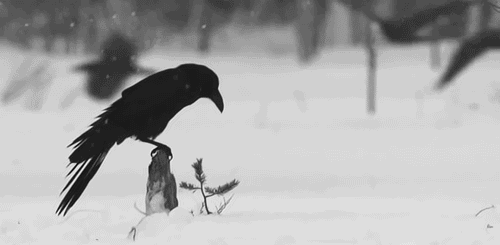
Resources
https://oreamnosoddities.com/blogs/news/how-to-make-a-bindrune-Bindrune explaining
https://oreamnosoddities.com/blogs/news/rune-meanings-the-elder-futhark-elder futhark source
http://www.shieldmaidenssanctum.com/blog/2019/3/12/the-elder-futhark-runes-and-their-meanings- elder futhark sources
https://youtu.be/nK51UmwJxRU-bindrune source from witches view with a little misinfo on Helm of Awe and Vegvisir
https://youtu.be/wG9d95vJibk-Bindrune source from Jackson Crawford
https://youtube.com/playlist?list=PLATNGYBQ-TjrPCf9YGy0qzqca1ypcGs50-Jackson Crawfords videos on runes through historical source
https://youtu.be/IROvre0w6hc-Vegvisir info
https://youtu.be/kW9KbtjyHN4-intro to runes
https://youtu.be/Gjmxu7z04kk-explaining the connection between the runic writing and languages
“Runes For Beginners” Lisa Chamberlain
“A Little Bit Of Runes” Cassandra Eason
“Nordic Runes” Paul Rhys Mountfort
“The Poetic Edda” Translated by Jackson Crawford
“Tales Of Norse Mythology” Helen A. Guerber
https://drive.google.com/file/d/1F5INHBpAeUZ8Ux632760FbNQ0SUHDUGX/view?usp=drivesdk-Reading Past Runes book
https://drive.google.com/file/d/1p5L1BFpUFRte-BVq7XgBdXLjAqqZKKkI/view?usp=drivesdk-Nine Doors Of Midgard book
https://drive.google.com/file/d/1EGtRedzunDGtUYkAbtdDrOQS0ppBBH9t/view?usp=drivesdk-The Big Book Of Runes book
#witchcraft#witchythings#beginner witch#witch tips#witchblr#norse runes#runes#norse mythology#norse pantheon#norse paganism#norse gods#norse heathen#runic#runic magic#study notes#notes#witch community#nordic#rune magic#rune stone#rune symbols#witchyvibes#studyblr#study blog#paganism#wow#runestones#rambles#spilled ink#photography
25 notes
·
View notes
Text

2,600-Year-Old Temple Filled With ‘Exotic Offerings’ Found in Greece
In 2017, while exploring a sanctuary devoted to a goddess in Greece, archaeologists discovered the first traces of a monumental structure at the heart of the sanctuary.
Now, after years of excavations, the team has unearthed what has been identified as a temple filled with treasures, altars and “exotic offerings,” according to a Jan. 8 news release from the Swiss School of Archaeology in Greece, which oversaw the excavation with the help of the Ephorate of Antiquities in Euboea.
The temple was discovered “at the heart of the sanctuary of Artemis Amarysia,” researchers said. Artemis was the Greek goddess of wild animals as well as chastity and childbirth.
Archaeologists said the temple — which was built sometime toward the end of the seventh century B.C. — “held a number of surprises,” starting with is floor plan. The building was apsidal, meaning it had a semi-circular dome-like structure at one end.
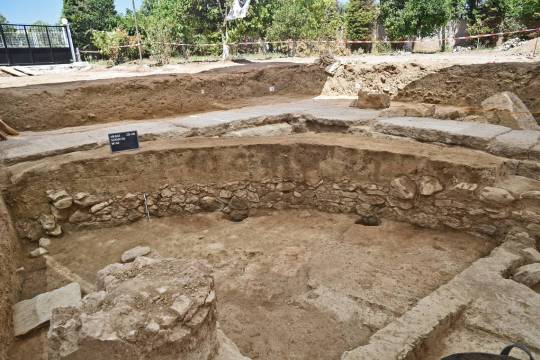
This kind of floor plan, popularized during the Early Christian era between the fourth and eighth centuries A.D., was “quite unusual” for the time the temple was built, the team said.
The temple was “larger than originally anticipated,” measuring about 100 feet, according to experts. This measurement is symbolic, and several other monuments from the same period share the same dimensions.
Inside the structure, researchers found “another surprising discovery”: an abundance of hearths or altars.

Typical Greek sanctuaries of the time built these structure outside of the temple, but archaeologists said they found the stone platforms — covered with thick layers of ash and bones — within the building.
One altar, shaped like a horseshoe, appears to have occupied a pronaos — a vestibule surrounded by columns on the exterior of the temple — and has evidence that it was used as early as the end of the eighth century B.C., predating the temple, officials from Greece’s Ministry of Culture said in a Jan. 8 news release.
The team also discovered a rich collection of offerings, it said.
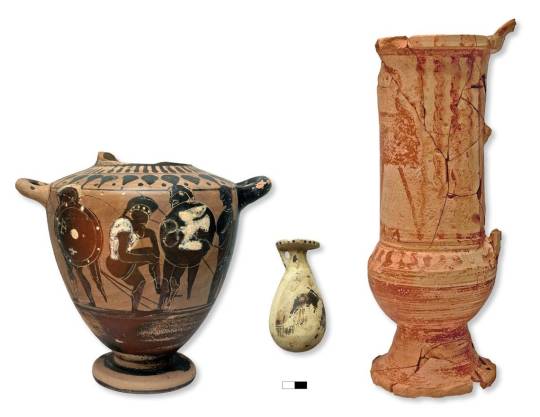
Among their finds were alabaster artifacts, vases, ritual water jugs, amulets, bronze and iron fittings, and precious jewelry made of gold, silver, coral and amber, officials said in their release.
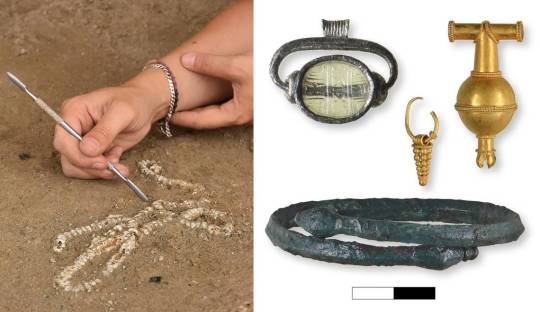
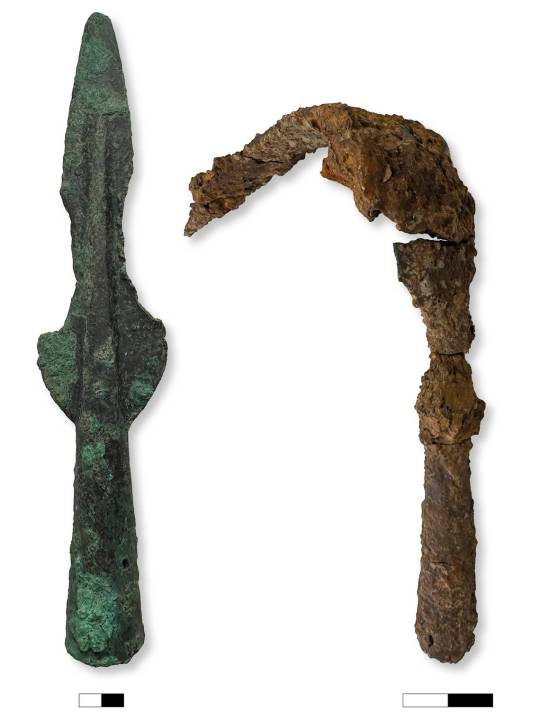
Experts also identified a “finely chiseled ivory head with Egyptian features,” they said. The “exotic” object was “unrecognizable” when first identified, but it has been restored.

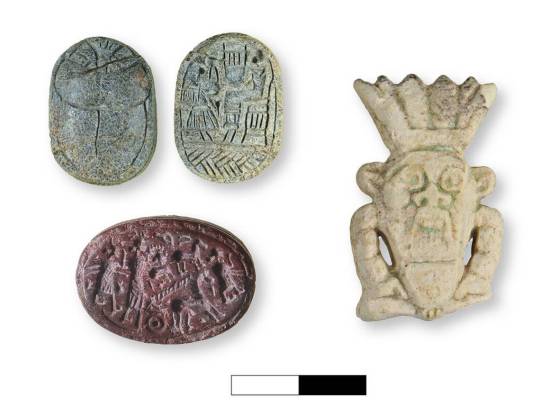
Evidence at the temple indicates that it partially burned down in the later half of the sixth century B.C., according to archaeologists. The building was temporarily restored with mud brick walls until it could be entirely replaced and restored at the end of the century.
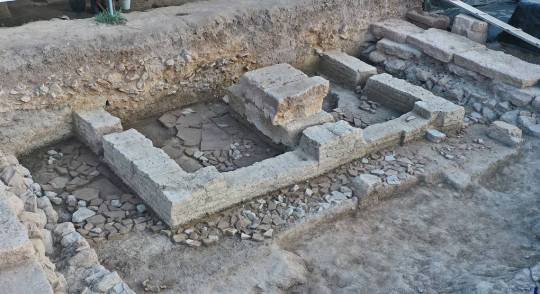
EVIDENCE OF AN EVEN EARLIER TEMPLE
Beneath the foundation of the temple, archaeologists said they discovered deep trenches containing remains from a building possibly dating to the ninth or eighth century B.C.
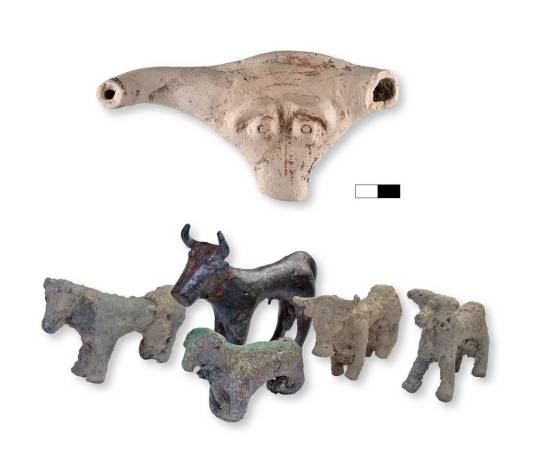
Bronze animal figurines from the same period and a terracotta bull’s head dating to the late Bronze Age — roughly 1200 B.C. — were also found in the trenches, according to researchers. Excavations of the lower levels of remains are ongoing, but early finds indicate that the site was used by Artemis worshipers earlier than the temple’s construction.
BRONZE AGE REMAINS NEARBY
The sanctuary of Artemis Amarysia is at the foot of a hill that was occupied during the Bronze Age, experts said.
Excavations of the hill have identified “imposing walls” that likely belonged to a third millenium B.C. fortification system, archaeologists said.
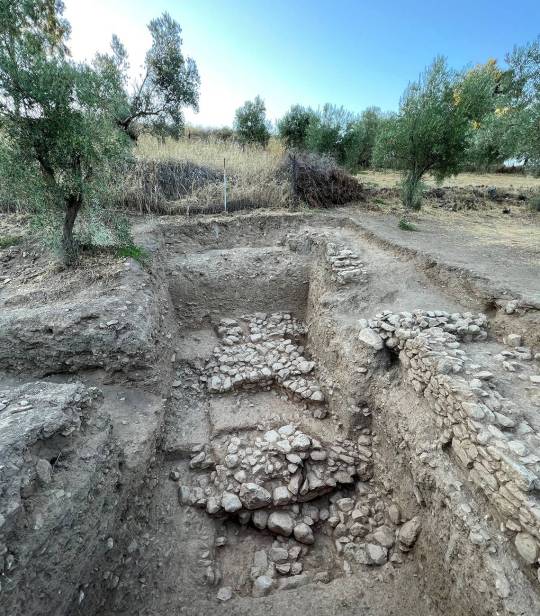
A tomb, filled with skeletons and offerings, was also unearthed from the hill, according to Greek officials.
Researchers continue to explore the region to determine how the temple and sanctuary fit into the broader “ancient landscape,” they said.
Amarynthos is on the Greek island Evia, also known as Euboea, which is off the country’s southwest coast.
By MOIRA RITTER.
#2600-Year-Old Temple Filled With ‘Exotic Offerings’ Found in Greece#he sanctuary of Artemis Amarysia#Greek island Evia#temple#ancient artifacts#archeology#archeolgst#history#history news#ancient history#ancient culture#ancient civilizations#Ancient Greece#greek history#greek art
41 notes
·
View notes
Text
Maaloula is synonymous with martyrdom and miracles. Scaling the cliffs that tightly contain it, Maaloula’s sacred and secular architectural wonders rise several stories, usually wearing a wash of blue distemper. Were it not for the vineyards and olive and apricot orchards that carpet the surrounding valley, a casual visitor might ponder how the townspeople have survived the mountains’ sun-dried, barren landscape for millennia.
Mitchell Prothero 2008
Maaloula is a Christian town some 50km from Damascus in the north-eastern Damascus countryside, overshadowed by the Qalamoun mountains.
Residents of Maaloula still teach and speak the same dialect spoken by Jesus of Nazareth - the ancient language of Aramaic originated more than 900 years before Christ and was widely used throughout the Middle East from B.C. 1200 to A.D. 700.
The Syrian government under President Assad established a new Aramaic Language Institute in Maaloula to preserve the Aramaic language that was gradually dying out in the region. This is from a Guardian article in 2009:
In Syria there are a lot of minority groups: Circassians, Armenians, Kurds and Assyrians, so it's a big decision to allow the teaching of other languages in government schools - But the government is interested in promoting the Aramaic language because it goes back so deep into Syria's history.
3 notes
·
View notes